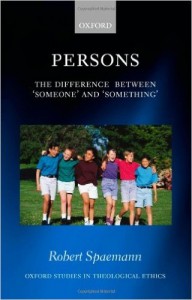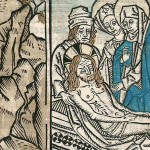AR: What role does theology play in the phenomenology of the person? I’m reminded of how you talk of the person, using Coleridge’s Eucharistic language, as a self-monstrating reality. If such labels are appropriate then is revelation an essential element for understanding the person? Does the sidelining of theology in almost all contemporary discussions greatly impoverish those discussions? Or is it possible that some aspects of the theology of the person have sunk in so deeply that they still influence our intellectual debates? I’m thinking of something along the lines of what Vincent Pecora talks about with regard to Original Sin in Secularization Without End.
TP: The central and indispensable role of theology for any phenomenology of the person owes to the fact that the concept of person was first developed by Patristic theology and then reengaged at various points over subsequent centuries. No other discourse exhibits either the depth or the continuity of reflective effort in understanding personhood. At the same time, philosophy has periodically made significant contributions to that effort. As I retrace in chapters 17-19, sifting the logic and presuppositions of the Trinity had furnished the initial impetus for a coherent account of personhood, and it did so by gradually revealing personhood to be grounded in, and constituted as, a relational rather than substantivist framework. In the event, theological reflection on the Trinity also ended up yielding crucial insight into human personhood.
Notably, the key insights of pre- and post-Nicaean accounts of personhood are fundamentally incommensurable with modern concepts of individuality and inter-subjectivity. First, writers like Basil of Caesarea, Augustine, Boethius, and later on Richard of St. Victor, realized that personhood is not something we “possess” like various other contingent traits (e.g., baldness, sensitive skin, or good bowling skills). Rather, it encompasses our entire living reality and presence – both to ourselves and to others. As Robert Spaemann puts it in his study, Persons: The Difference Between Someone and Something: “‘person’ is not a classificatory term … [It is] distinguished by not being a predicate of any other thing but identifying things that may be the subject of predicates.”

If personhood cannot be captured predicatively, that is, by ascribing sundry attributes to a given individual, if it cannot be secured by an act of definition, it is bound up with the event of recognition. Yet the latter cannot, logically speaking, be framed as a purely discretionary event of one person recognizing another. For even where someone denies a person such recognition, we do not speak of an absence but of a failure of recognition. This tells us that the ethical imperative of recognizing the personhood and unconditional reality of the other is anterior to subjective inclination or will. And it is here that modern philosophy with its axiomatic stress on autonomy and a contract-model grounded in the autonomous, rights-bearing individual strikes me at having been at a considerable disadvantage vis-à-vis Christian and Jewish theology. For an act of unconditional recognition discloses to me who – not what – someone is as a person, in contradistinction to a contingently socialized “self” or “individual.”
Subsequent to Coleridge, who among the Romantics was unique in being aware of and actively retrieving the theological backstory, Martin Buber and Emmanuel Levinas were among the very few thinkers who, drawing on different genealogies of inquiry, recognized that the I-Thou relationship cannot be reduced to a contingent and elective subjective experience. Parenthetically, I may add that Borja Vilallonga’s claim, in his response at last year’s Immanent Frame forum on my book, that my conjunction of Coleridge, Buber, and Levinas on the I-Thou relationship amounted to “Christianizing” of Jewish thought was a particularly gross distortion embedded in what, overall, still strikes me as a shockingly unintelligent and willfully misleading response [See: My response to his claims here].
As for the question of whether “revelation [is] anessential element for understanding the person?” and whether “the sidelining oftheology in almost all contemporary discussions greatly impoverish[es] those discussions,” I think the answer in both instances ought to be a qualified “yes.” For contrary to a lot of shoddy theological notions floating around in popular culture today, “revelation” ought not to be construed as the magical disclosure of some transcendent enigma “out there” but, rather, as a surfeit or “excess” (Marion’s preferred term) of givenness, grace, and presence in Being – that is, in what and who is, and always has been, with us. Where relationality is acknowledged as the most elemental mode of access to personhood – our own no less than that of the Thou in whose presence we find ourselves – such revelation is phenomenalized as love (caritas), a theological virtue whose achievement, as with all the virtues, pivots on a life-long process of cultivation, practice, and detachment (kenosis) from the fetish of the autonomous self.
Finally, as to whether there are “some aspects of the theologyof the person have sunk in so deeply that they still influence ourintellectual debates,” that’s difficult to say. While my inclination is to say “yes,” the influence would have to be traced against the grain of a long history of conceptual amnesia that Minding the Modern addresses by drawing on salient arguments by Iris Murdoch and Cora Diamond. Moreover, there is also deeply ingrained within modern thought (e.g., Descartes, Hume, Fichte, Nietzsche and their various rationalist or skeptical heirs) a strong resistance to any suggestion that our sense of identity and reality might be constrained by meanings and conceptual frameworks that we cannot unilaterally control and define.












